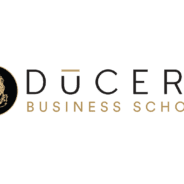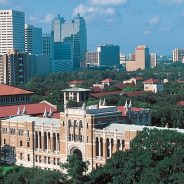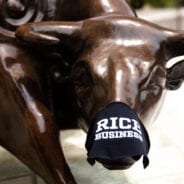Search results for :
Georgetown Launches MS in Environment & Sustainability Management
As business schools are starting to resume in-person classes for the fall, many students are looking forward to returning to campus and connecting with fellow classmates & professors. This year, Georgetown University made an announcement that made the return to campus even more memorable: they will be offering a new Master’s Degree in Environment and Sustainability Management. This joint degree with McDonough, the Graduate School of Arts and Sciences, and the Georgetown Environment Initiative gives students the opportunity to learn both from business professors and environmental science professors.
The program will begin in August 2022 on the Georgetown University Campus in Washington, D.C. It will be a STEM designated program leveraging the university’s expertise in both environmental science and business. Over eleven months, students will experience a mix of courses and activities that will prepare them to become leaders and advance sustainable businesses or environmental practices.
While taking these courses, students will work toward a career focused on protecting the environment. Meanwhile, they will have the opportunity to enjoy the unparalleled access only Washington, D.C. offers to leaders, policymakers, industry experts, transnational organizations, global corporations, nonprofits, and government entities. Students will also get to learn from instructors who have been at the forefront of sustainability. Equipped with creativity and knowledge, instructors are able to give students at Georgetown McDonough the knowledge they need to make a strategic societal impact within any organization.
To earn the degree, students must complete all sixteen courses. The curriculum content includes sustainability and environmental science, climate change impact and measurement, energy technology principles and applications, and more. The program ends with an exciting capstone course where students get to work in teams on real-life, hands-on projects and consult with an organization to gain experience solving business and environmental challenges.
If you are interested in applying to Georgetown McDonough’s MS in Environment & Sustainability program, you will need a to submit a resume, personal essay, video essay, two recommendation letters, and transcripts. For more detailed information about the application process, you can visit the admissions overview webpage.
Where Should I Work: JP Morgan Chase or Citibank?

Citigroup and JP Morgan Chase (JPMC), both headquartered in New York City, sit side by side on the list of the Big Four banks in the U.S. Each provide investment banking and other financial services to a wide variety of institutions, governments, private investors, and corporations.
Applicants with MBAs are obviously in high demand at both companies, and competition is fierce for positions at either one. Here we’ll compare the two and hopefully lend some insight into which one is the best fit to your career goals.
Internships
JP Morgan Chase offers internships for both early year undergrads and for postgraduate students. The undergraduate Early Insight program has a variety of positions posted, and applicants can consult the site for opening dates. These are typically short term and take place in JP Morgan’s worldwide offices as well as online.
For graduate and later year undergrad students, Internships at JPMC are usually 10-12 weeks long, with longer terms available in certain regions and business divisions.
Citigroup offers internships for undergrad and graduate students at the analyst level. Associate level internships are available to MBAs and other Master’s students on a full-time or summer basis. Opportunities in the U.S. and at the firm’s global offices are all searchable and available for application online.
Interviews
According to figures posted on Indeed, both firms have a process that takes around two weeks from scheduling to notification of your next interview. One interviewee for an Associate position at JPMC advised to “be confident and give qualitative and quantitative details regarding previous experiences”. Another candidate recommends inquiring about your potential team’s goals, and initiating a conversation about how exactly you will fit into this scenario.
Interviewees at Citigroup also report an overall positive experience, with phone appointments lasting about fifteen to thirty minutes. At the end of the call, the interview team will notify you as to whether you’ll advance. A current employee in the Operations department said of their interview that it was “open and loose and to the point. Professional questions like a checklist.” Another hire in Investments Accounting said, “I was interviewed and got an offer a month later.”
Compensation
The most recent published data from Paysa states that Citigroup pays an average salary of $96,700, ranging from $63,000 in the 25th percentile to $118,000 in the 75th. Specific positions pay as follows:
- Investment Banking Analysts – $70,000 on average with a range of $60-79,000
- Financial Analysts – $84,000 on average; a range of $75-$91,000
- Credit Analysts – $62,000 on average; a range of $52 – $71,000
- Risk Analysts – $90,000 on average; a range of $78 – $100,000
- Technical Analysts -$93,000 on average; a range of $82 – $102,000
As for JP Morgan Chase, the average salary is $84,524, ranging from $52,146 at the 25th percentile to $104,814 at the 75th percentile. A breakdown by position is as follows:
- Private Client Banker – $67,000 on average; a range of $57 -$76,000
- Underwriter – $58,000 on average; a range of $53 – $63,000
- Financial Advisor – $65,000 on average; a range of $55-$73,000
- Technical Analyst – $75,000 on average; a range of $65-$84,000
- Business Analyst – $92,000 on average; a range of $82 – $103,000
- Senior Business Analyst – $118,000 on average; a range of $104 – $130,000

Culture
JPMC employees have described the culture there as “fast paced and stressful” which should come as no surprise to anyone familiar with the investment banking world. Another worker said, “always be on task, time management is key but you must know how to manage your time before [getting hired]… it is not something that can be taught nor is it the responsibility of management.” Hours were generally reported as average for the industry, sometimes 40 per week but often more. Dress code is business casual/corporate casual according to the majority of employee reviews.
Again, no surprises with Citigroup when one employee said, “[it’s a] competitive environment in a highly competitive market. Management focused on profit, client service and emphasized adherence to compliance parameters.” Another Citi employee rated it a 5/5, saying, “The environment if fun and professional at the same time. The managers are organized and passionate about what they do.” Other workers cited increased stress at year-end, and yet another mentioned that their office was “in a constant state of change”.
Most reviewers said that hours were 40-45 per week on average with an increase during busier quarters. As for dress code, Citi is also business/corporate casual, and employees can earn a ‘jeans badge’ by donating money to charity.

Career Development
Citi offers promotions after 6 months, and raises once a year. Bonus structure here is strong and reliable, and any pay increase is based upon a ratings system.
JPMC’s promotion system is less well documented by employees, and one said, “pay raises are guaranteed. However, the amount is unknown.”
Both companies provide an impressive benefits package including healthcare and wellness coverage, retirement plans, and family leave, among others.
Recruiting
JPMC recently updated their university recruiting schedule; details on the changes can be found here. Citi also offers a robust recruiting program globally, with events updated here.
Executive MBA
Ducere Executive MBA Program Structure
The Ducere Executive MBA is delivered with the University of East London. The mission is to bridge the gap between education and industry by designing an MBA with real career impact. Ducere collaborates with business partners around the world to stay up-to-date on global business challenges to ensure the program is innovative and industry-relevant. Instead of a traditional exam-based approach, assessments are project-focused, as real learning comes from practical implementation
The structure of the program includes five modules, covering a wide range of critical business topics and a Major Applied Industry Project, to provide students with the opportunity to transform theoretical concepts into real-time business projects.
The five MBA course modules are:
Business Strategy
Leadership in Practice
Digital Transformation
Marketing and Communications
Finance for Managers
+ Major Applied Industry Project
Curriculum
Module 1: Business Strategy
Evaluate various strategic frameworks and concepts across various organizational contexts, to foster successful business outcomes.
Strategic concepts and their role in business performance.
Strategic frameworks and their use in business decision-making.
Strategies to achieve business goals and create competitive advantage.
Strategies and their likelihood of achieving business goals.
Risk response and evaluation on strategic projects.
Variations of strategic change and relevant approaches to managing change.
Module 2: Leadership in Practice
Explore the definitions of leadership and prepare to develop the necessary capabilities to prosper in this environment.
The importance of leadership and its associated challenges.
Key leadership themes and concepts and how they can be utilized.
Concepts of self-leadership and self-awareness.
The role of emotional intelligence in effective leadership.
Module 3: Digital Transformation
This module enables students to explore the rapid technological and digital advancements within business and the impacts on the structure, people, and processes. The emphasis is on developing analytical and process skills to be able to make critical decisions about technological and digital change in organizations.
Digital disruption in business: rethinking strategy, customers, competition, data, innovation, and value.
Digital transformation as an adaptive process.
The essentials of digital transformation.
Understanding barriers and exploring methodologies.
Designing, implementing and managing processes.
Communication, engagement and iteration.
Module 4: Marketing and Communications
This subject enables students to critically examine marketing management from a customer-driven perspective. This includes evaluating and designing frameworks for fundamental concepts such as segmenting, targeting, and positioning. Customers, due to increased connectivity, have access to information and options from around the globe in a matter of seconds.
Key Marketing concepts, such as market research, buying behavior, product management and marketing communications.
Marketing strategies, including pricing and channels, segmentation and planning.
Brand management, including brand equity, brand research and brand marketing.
Module 5: Finance for Managers
This subject introduces core concepts and practices relating to finance, managerial accounting and managerial Economics. Students develop the ability to interpret and critically evaluate organizational financial information and extract data from financial statements and reports for reporting and decision-making purposes.
Interpret financial statements and extract critical information to make business decisions.
Develop an understanding of information that is used in managerial reports for internal reporting.
Develop advanced knowledge about financial management imperative to managing firms’ investments and resources.
Analyze the financial decisions from a corporate treasurer’s point of view.
Understand and identify factors impacting managerial decision-making.
Explain managerial decision-making under different market conditions.
Evaluate the impact of external and internal factors on managerial decision-making.
Major Applied Industry Project
This module enables students to consolidate skills, knowledge and insights by working with a group of student peers on a consultancy-style global challenge, provided by a Ducere Global Industry Partner.
The aim of this module is to develop the practical and professional abilities to review business and management research with academic rigor, in order to develop a concept, solution, or idea that has immediate practical application.
Learning Outcomes
Frame a successful research proposal.
Develop and understand research methodologies and apply them to a sophisticated business case study scenario.
Propose, plan, manage and execute in-depth and business management case study research.
Use your project management skills to budget, manage your time and other resources, handle data and interpret results.
Craft your case study influenced by the knowledge you gain from the coursework modules.
Write a report of your research results for an academic and professional audience.
Tuition, Scholarships, and Financial Aid
The current total cost of the Executive MBA program at Ducere Global Business School is $18,600. Payment Plans are available with the cost divided into three installments to be paid over the first part of the MBA.
Loans are also available for the program. UK residents may be eligible for a Postgraduate Student Loan to cover all or part of the fees. US students can apply for Sallie Mae loans to cover all or part of the fees
Admissions for Ducere Executive MBA
To be eligible for the Ducere Executive MBA you must have either:
Bachelor Degree from an accredited university with 8+ years of professional management experience
OR
10+ years of professional management experience
No GMAT or GRE is required for entry into the program.
It is free to apply to the program.
Application deadlines are within:
February
June
September
Online MBA
Ducere Online MBA Program Structure
The structure of the Ducere Online MBA includes six modules covering a wide range of critical business topics and a Major Applied Industry Project, to provide students with the opportunity to transform theoretical concepts into real-time business projects.
The Six MBA course modules are:
Global Business Challenges
Human Resource Management
Marketing Management
Finance for Business Management
Change and Stability Management
Strategic Management
+ Major Applied Industry Project
Curriculum
Delivered with the University of Wales Trinity Saint David, the mission is to bridge the gap between education and industry by delivering an MBA with real career impact.
The program collaborates with global leaders and business partners around the world to stay up-to-date on business challenges to ensure programs are innovative and industry-relevant.
Instead of a traditional exam-based approach, the assessments are project-focused, since real learning comes from practical implementation.
Supplement learning with Ducere Global Business School’s exclusive guest lecture series, insights and case studies from hundreds of world and elite business leaders.
Tuition, Scholarships, and Financial Aid
The current total cost of the Online MBA program at Ducere Global Business School is $14,920. Payment Plans are available with fees paid over 6 installments over 2 years (1 payment every 4 months).
Loans are also available for the program. UK residents may be eligible for a Postgraduate Student Loan to cover all or part of the fees. US students can apply for Sallie Mae loans to cover all or part of the fees
Admissions
To be eligible for the Ducere Online MBA Program you must have either:
Bachelor Degree from an accredited university with 3+ years of professional management experience
OR
5+ years of professional management experience
No GMAT or GRE is required for entry into the program.
It is free to apply to the program.
Application deadlines are within:
February
June
October
MBA (Innovation + Leadership)
Ducere MBA (Innovation + Leadership) Program Structure
The Ducere MBA (Innovation + Leadership) is delivered with the University of Mauritius and the mission is to bridge the gap between education and industry by delivering an MBA with real career impact. The program collaborates with global leaders and business partners around the world to stay up to date on business challenges to ensure the online programs are innovative and industry-relevant. Instead of a traditional exam-based approach, assessments are project-focused, as Ducere believes real learning comes from practical implementation.
Learning is supplemented with the Ducere Global Business School’s exclusive guest lecture series, insights, and case studies from hundreds of world and elite business leaders.
The structure of the programme includes 11 modules covering a wide range of critical business topics and a Major Applied Industry Project, to provide students with the opportunity to transform theoretical concepts into real-time business projects.
The 11 MBA course modules are:
Ethics in Decision Making
People and Culture
Business Accounting and Finance for Managers
Research Methods
Project Management
Digital Transformation and Emerging Technologies in Business
Digital Marketing and Communication
Business Economics
Leadership in Practice
Entrepreneurship and Innovation
Business Strategy
+ Major Applied Industry Project
Curriculum
| Module 1: Ethics in Decision Making Get familiar with ethical and sustainability issues that leaders face in today’s business environment through identifying causes of the current state of the economy and environment.Identify Inclusion and diversity as an approach to value creation in modern organizations. Define different elements of culture and behavior prevalent in organizations. Get familiar with processes involved in creating positive, productive and stable workforces in the 21st century. Leverage diagnosis, designing and delivery tools to manage people-related challenges. Study processes to design, lead and manage organizational change.Module 2: People and Culture Critically appraise the strategy of the HR role within varying sectors nationally and internationally. Understand and analyze organization design, culture and development including analysis of internal and external environments. Develop key leadership practices relevant to students’ own organizations, including performance management and work practice innovation.Module 3: Business Accounting and Finance for Managers Interpret financial statements and extract critical information to make business decisions. Develop an understanding of information that is used in managerial reports for internal reporting. Develop advanced knowledge about financial management, imperative to managing firms’ investments and resources. Analyze the financial industry and decisions from a corporate treasurer’s point of view. Understand and identify factors impacting managerial decision-making. Explain managerial decision-making under different market conditions. Evaluate the impact of external and internal factors on managerial decision-making.
Module 4: Research Methods Module 6: Strategic Management Module 7: Digital Marketing and Communication Module 8: Business Economics Module 9: Leadership in Practice Module 10: Entrepreneurship and Innovation Module 11: Business Strategy |
Career Information
The MBA (Innovation + Leadership) has corporate partners including the United Nations, LinkedIn, Save the Children, Disney, KPMG, PWC, 20th Century Fox, Qantas
Tuition, Scholarships, and Financial Aid
The current total cost of the MBA (Innovation + Leadership) program at Ducere Global Business School is $6,932. Payment Plans are available and the tuition is payable in 3 installments of $2,310 each.
Admissions
To be eligible for the MBA (Innovation + Leadership) program at Ducere Global Business School you must have either:
Bachelor Degree from an accredited university with 3+ years of professional management experience
OR
Diploma qualification from an accredited institution PLUS 10 years of working experience.
No GMAT or GRE is required for entry into the program.
It is free to apply to the program.
Application deadlines are within:
March
September
Ducere Global Business School
History
Ducere Global Business School is a recognized leader in university–enterprise collaborations, to design and deliver degrees that have a real career impact. Ducere partners with major universities across four continents, global corporations, government departments, and NGOs, as well as being a member of the AACSB, Clinton Foundation, United Nations, and various global chambers, to ensure that the programs are current, relevant and industry connected.
Ducere has a mission of both business and philanthropy. Ducere has funded and supported the activities of the Ducere Foundation across 27 African nations to the tune of millions of dollars.
With offices in the United States, Australia, the UK, and Africa, Ducere constantly strives to promote equity and access in education globally.
Ducere Global Business School Locations
Ducere is an online business school but with its partnered universities, graduate in Wales, London, Mauritius, or Australia.
Ducere MBA Degree Offerings
| The Executive MBA |
Ducere Global Business School Contact Information
Address: 120 Newport Center Drive, Suite 50, Newport Beach, CA, 92660
Phone: (833) 738-2373
Email: study@ducere.education
Website: https://ducere.education/
Blog: https://blog.ducere.education/?_ga=2.235750977.172220997.1623779423-1206259965.1620912588
Twitter: https://twitter.com/DucereEducation
Dynamic Diversity at Imperial College Business School – Opportunities for Female Students are Changing the MBA Landscape
As the deadline draws near for the upcoming Full-Time MBA class to apply, Imperial College Business School hopefuls may be weighing their funding options. Female students in particular are making up more and more of the demographic seeking an MBA. In fact, this past Full-Time cohort at London’s Imperial College Business School saw 43% of its class identify as female. They’re hoping to raise that number to 50% and to do so, they’ve got resources.

Olivia Xu, Forté Fellow
A Forté Foundation partner, Imperial College hosts the Imperial MBA Women group to create a support system and foster networking opportunities for current and graduated female students. The group holds virtual meetings and utilizes a WhatsApp chat to continue open communication during the current pandemic. The school offers a wide array of scholarships including Forté Fellowships worth more than £27,000.
MetroMBA spoke with Olivia Xu, a current Forté Fellow and Full-Time MBA student at Imperial College Business School. ‘Being a Forté Fellow has not only provided me financial help during the MBA, but also a vast network of other businesswomen who are or have gone through the same journey that I am. It was through Forté that I was able to meet other women across the globe who have similar interests and be able to network and connect with them’ stated Olivia. An international student from the US, Olivia said she was attracted to Imperial because her goal was to attend, ‘a school with a strong track record of keeping the environment at the forefront. Her program focus is on sustainability and responsibility and she hopes to work at a fashion start-up that is striving to reduce fast-fashion waste after graduation. With the recently initiated Sustainable Imperial Strategy designed to transform the school into a carbon net-zero institution by 2040, it’s no surprise students are opting to attend Imperial College Business School to further their careers while making a global environmental impact.

Morgan Mixon, Forté Fellow
Olivia isn’t the only student seeking to make this impact and achieve her MBA from abroad. The diverse and inclusive student demographic (currently consisting of students from 23 countries) entices MBA candidates from all over the world. Morgan Mixon is also a Forté Fellow and Full-Time MBA student at Imperial College Business School. She said that her fellowship plugged her into an ‘international network of women who are thinking about, pursuing or graduates of MBA programmes’. Morgan is currently specializing in innovation and entrepreneurship. She chose Imperial because it’s a top STEM university with, ‘a business school whose leaders and students also are passionate about driving bold change in the world’. She is the co-founder of Cleanest, striving to reduce the diaper industry’s environmental footprint and create healthier, more sustainable wear for infants.
The success of these MBA candidates should come as no surprise. Imperial College Business School’s Full-Time MBA program is one of the first to receive a department-level Bronze Athena SWAN award from the Equality Challenge Unit(ECU) in recognition of its commitment to tackling gender inequality in higher education. For female students looking to apply to the program, they should know they’re in good company.
Students seeking to apply are encouraged to utilize the scholarship resources offered by the school and complete applications prior to the upcoming June 18th deadline to attend this coming fall.
Real Humans: Rice University’s Jones Graduate School of Business, Executive MBA
We recently caught up with two members of the Rice Jones Executive MBA Program to learn a bit more about their background, their reasons for choosing to pursue an MBA, and why they selected Rice. We also learn a bit more about the Rice Executive MBA Program and what each student has planned for after they complete their program. Read more about James & Keri in the pages that follow.
Real Humans: Rice University’s Jones Graduate School of Business, Professional MBA
We recently caught up with three members of the Rice Jones Professional MBA Program to learn a bit more about their background, their reasons for choosing to pursue an MBA, and why they selected Rice. We also learn a bit more about the Rice Professional MBA Program and what each student has planned for after they complete their program. Read more about Tohfe, Steve & Chelsea in the pages that follow.
Rice University’s Jones Graduate School of Business Q&A with Assistant Director of Recruiting Kalyn Speck
Kalyn Speck, the Assistant Director of Recruiting at the Rice University Jones Graduate School of Business, recently sat down with MetroMBA to share insight into the Professional MBA Program. Kalyn works with prospective candidates for the MBA programs as well as the dual-degree programs at Rice.
MetroMBA: How does this program differentiate from other offerings at your school and other programs in the GME space?
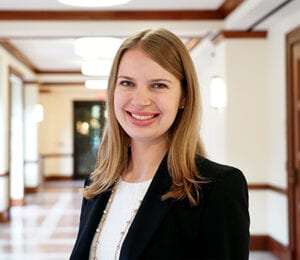
Kalyn Speck: The Professional MBA program is our in-person MBA option for working professionals. Rice Business offers an evening schedule and an alternating weekend schedule, so students can find a program that aligns with their work and family commitments. Our students can choose from over 100 electives and numerous experiential learning opportunities to customize the program to meet their specific career goals. Experiential opportunities include a Global Field Experience, the Wright Fund, the Athena Group (our student-run marketing agency), and the Rice Business Board Fellows — just to name a few. Classes are held on campus, so our Professional MBA students have access to everything Rice University has to offer including the Fondren Library, the Gibbs Recreation and Wellness Center, The Doerr Institute for New Leaders, sporting and arts events, etc. The schedule and class profile for our Professional MBA differentiates the program, but it is important to also note the similarities. The Professional MBA awards the same Rice MBA degree, and the students have access to the same clubs & organizations, Career Development Office, and faculty as our Full-Time MBA students.
MetroMBA: What is the typical profile of a student who would benefit most from this program and what characteristics are your admissions team looking for?
Kalyn: Our Professional MBA program is filled with students who want to obtain an MBA while continuing to grow their careers by staying employed. These students could be pursuing an MBA to accelerate their careers at their current company or to pivot their careers to explore new opportunities. Students benefit the most from this program if they already have post-graduate work experience to discuss in the classroom and a desire to fully engage with the Rice Business community — even outside of the classroom. Students should understand the importance of building their professional MBA network and be ready to work closely with other students with diverse backgrounds. The admissions team is looking for students who can handle the academic rigor of our courses, contribute to the close-knit community at Rice Business, and benefit from the typical MBA career paths. Additionally, and most importantly, we want students who are excited about Rice Business!
MetroMBA: What types of financial aid are available to students?
Kalyn: Our Professional MBA applicants are automatically considered for limited merit-based scholarships when they apply to the program. We also have a Student Financial Services team that offers one-on-one consultations with admitted students to discuss their unique financial situation, the loan process, tuition payment plans, and other financial aid opportunities.
MetroMBA: How does your school assist in finding job opportunities and how does your program enhance a student’s profile as a job applicant?
Kalyn: Rice Business has a fantastic Career Development Office that exclusively supports our MBA students. This office is comprised of two teams: Career Advising and Employer Relations. Our career advisors provide career coaching to help our students prepare for the corporate recruiting process or promotion conversations. One amazing perk of our program is that alumni still have access to our career advisors. The other team in the Career Development Office focuses on developing relationships with companies. The Employer Relations team assists companies with hiring our MBA students via information sessions, coffee chats, club events, industry treks, job boards, sponsorship, etc. Students can also access additional corporate recruiting support and company engagement events by joining an MBA Professional Association. Some of the most popular Professional Associations are the Consulting Association, Finance Association, Entrepreneurship Association, Technology Association, and Rice Business Board Fellows. Our program enhances a student’s profile by developing them as leaders, creating a safe space for them to apply what they learn during experiential learning opportunities, teaching them how to properly navigate the corporate recruiting process, and customizing the curriculum to achieve their specific career goals.
MetroMBA: What is one insider tip you can provide prospective applicants about applying to this program?
Kalyn: I am always surprised by the number of applicants who don’t know about our GMAT waiver request form! We review every request submitted, so I always suggest going ahead and submitting a request even if you think you don’t qualify. You might as well see what happens! You can find the request form on our “MBA Admissions Guide page.” I also suggest applying before our final application deadline. We have a rolling admissions process, so our class could fill up before the final deadline.
Lightning Round
What is one restaurant every student must visit and why?
I can only pick one?! Houston has so many amazing restaurants… so this is the hardest question yet! I guess I would have to say Treebeards. It is a great spot for some southern, Cajun, comfort food, and it is owned by one of our MBA alums! Think gumbo, jambalaya, red beans & rice, etc. They also have a fantastic selection of desserts!
Where is the best cup of coffee on campus?
We have a beautiful new coffee shop (Audrey’s) in McNair Hall, which is home to Rice Business. However, I still walk across the street to grab coffee at the student-run coffee house in the Rice Student Center. This is my favorite spot because they have my favorite drink —- the Nutty Bee! It is a honey and hazelnut latte that you have to try if you are on campus.
What is the best ‘hidden secret’ on campus?
It has to be our graduate student bar, Valhalla! It is in the basement of the Engineering building, so it is actually a hidden secret. This bar is known for its beer specials and Viking theme.
Contact:
Name: Kalyn Speck
Title: Assistant Director of Recruiting
Email: kalyn.m.speck@rice.edu
Phone: 713.348.3732
Toll-Free: 888.844.4773
Real Humans: Rice University’s Jones Graduate School of Business, Full-Time MBA
Olaniyi Dada, Rice University’s Jones Graduate School of Business, Full-Time MBA Class of 2022
School and Program:
Hometown:
Houston, Texas
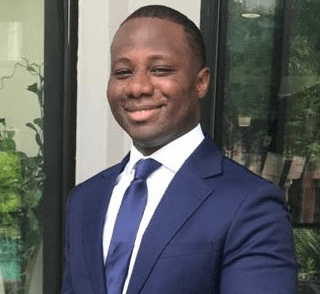
Olaniyi Dada, Full-Time MBA Class of 2022
Undergraduate Institution & Major:
Prairie View A&M University – Mechanical Engineering
Pre-MBA Work Experience:
I have worked at General Electric Oil and Gas and Baker Hughes focused on the oil field service sector. I worked in the industry for over seven years.
Why Business School? Why Now?
I needed to make a career transition from energy technical engineering to energy finance. After seven years of achieving several heights and positions within the engineering sector, I felt I had reached my highest potential within engineering. It was time to challenge myself and pivot to the energy finance sector with a career in investment banking. After several discussions with Rice Business students and alumni, I knew it was the right school for my desired transition.
Why did you pick your school/program? What factors figured most prominently into your decision of where to attend?
I picked Rice Business specifically because of the intimate class size and close-knit culture and also the school is located in Houston, which is one of the most diverse cities in the country and the fourth largest city in the United States.
What do you think is your most valuable or differentiating contribution to your graduating class?
My most valuable contribution to my graduating class is to increase and improve the importance of diversity within the finance association. My goal is to generate more interest in finance careers such as Investment Banking, Private Wealth Management, etc. within the underrepresented minority students and ensure their paths to these finance careers are successful and impactful.
Fun fact that didn’t get included on your application?
I have a strong passion for music. I started drumming at the age 10 and have played for several local gospel artists and churches. I hope to become a music producer sometime in the future.
Post-MBA Career Interest:
Do your research and be specific on exactly what you hope to gain from the MBA program and have three to five top goals you want to accomplish while you are a student. Two years come around quickly, and you want to ensure you at least achieved your main objectives.
Advice to current prospective applicants:
After completing my MBA at Rice Business, I intend to become an investment banker at Bank of America. One of my highest aspirations is to advance diversity in the energy/finance industries. Therefore, I aim to develop within the scope of one firm and industry. By contributing to diversity advancement, I’ll be on my way to reaching my career goal.
What is your initial impression of the school’s students/culture/community?
The initial observation I made when I began at Rice Business was the overwhelming aspiration shared among my classmates. I was amazed by the diversity and candidness within the Rice Business community and the social and team-building events, such as Partio, that play a big part in bringing students from different backgrounds and cultures together.
Real Humans Alumni: Syracuse University, Whitman School of Management, On-campus MBA – Muhammad Khan
School and Program:
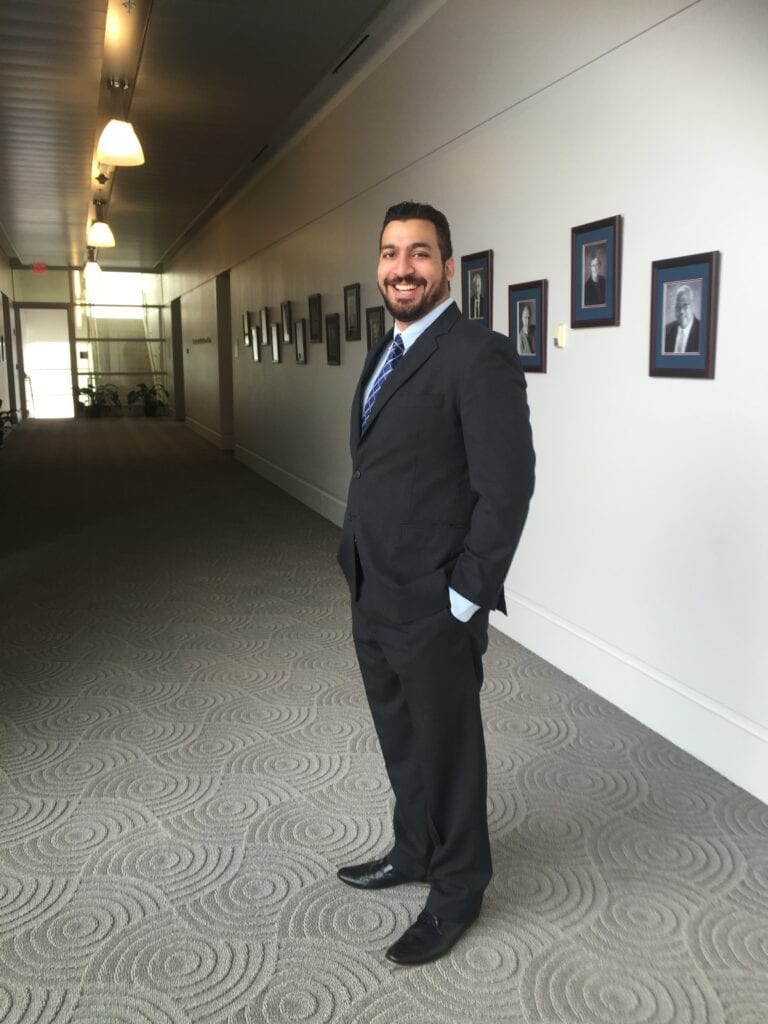
Syracuse Whitman On-Campus MBA
Hometown:
Lahore, Pakistan
Undergraduate Institution and Major:
Lahore School of Economics
Pre-MBA Work Experience:
I was running a solar solutions startup in Lahore, Pakistan, for 4.5 years. Prior to that, I had worked in the construction industry (2 years), and prior to that, I was in apparel sales management at Levi’s Strauss, Pakistan. Overall, I had about 9 years of work experience when I decided to pursue my MBA degree in the US.
What were the factors that led to you pursuing graduate degree? Why business school?
While working in Levi’s, I was not satisfied with the pace of work and wanted to build my own company. So, I went to Singapore for training with Levi’s, and used my free time to research the different types of first world technologies that were not available in Pakistan. This led me toward Solar Energy; Pakistan at this point faced an acute shortage of energy with rolling blackouts occurring on a daily basis. Thus, on my return, I started working on starting my own company on the side and a year later I left Levi’s to pursue my business full-time. Within a couple of years of starting my own business, I realized that I was really lacking in knowledge pertaining to running and setting up a business. I had the entrepreneurial spirit but lacked the know-how. This realization made want to pursue an MBA and specifically focus in Entrepreneurship.
What factored most prominently into your final choice of where to study? Why did you pick your school/program?
As I was researching my options, I heard about the Fulbright Program, which offers grants to qualified Pakistani graduate students to pursue their graduate education at a US university. I applied to the program and after my third attempt was selected as a Fulbright Scholar. Regarding my choice of university, I would call it serendipitous that I ended up at Syracuse University! As a Fulbright Scholar from Pakistan, I did not actually choose the final university, I had to provide them with a couple of choices and give them an outline program of interest. My focus was to get an MBA specializing in Entrepreneurship. Given that Syracuse University is very well-known for its Entrepreneurship program, the Fulbright program made the decision to add this to the list of schools they applied for on my behalf, I was then selected to pursue my MBA degree at the Whitman School of Management.
How did the school/program that you chose contribute to your career progression? How did what you learnt in the program help you find your post-graduation job?
Upon my return to Pakistan after completing my MBA, I realized that any competitive advantage that I might have had in my solar business had been lost in the two years and it did not seem prudent to restart that business. At Whitman, I had taken a business personality test through my course ‘Entrepreneurship 101’. Through subsequent conversations with my professor Johan Wiklund, I realized that I enjoyed innovating, building, and problem solving. With this insight, I reached out to a friend who was a corporate recruiter and explained the type of roles that I was seeking. She found me a team that was working in Innovation & Financial inclusion in Pakistan’s largest commercial bank Habib Bank Limited and after a rigorous interview process, I was hired as the Senior Manager, Product Digitization in 2018.
What was your favorite thing about the city/campus?
I loved the campus! I have literally traveled across the US and have visited more than 20 university campuses. But I can rank Syracuse University as one of the most beautiful campuses in the country. I appreciated that the city was not too large and that the population had a large student demographic. This made life outside the classroom that much more exciting. Also, being near the Finger Lakes, there was a lot to see nearby to get one’s mind off the rigors of classes. The international student center on campus made great efforts to help incoming foreign students break the ice with other students and I was able to make friends from all over the world. I am still in touch with a lot of my classmates from my program and with those, I had met through my interactions outside the classroom.
Would you do anything differently if you could research and apply to business school over again?
Yes. I would have taken more business analytics courses and taken an extra semester to get a second master’s degree in Business Analytics from Whitman. I loved my experience at Syracuse University, and I know that it has contributed to my growth, both professionally and personally, in ways I could not have imagined. As an example, for our B-School Capstone project, I had to work with my group to come up with a business idea and then create a formal business plan. We were all given roles in the new business and I was chosen as the CEO! During the course I had to manage my team and inspire them into delivering the work required. I must admit that initially I managed our team poorly, due to not being able to communicate well with them, which led to some tense moments. But after I sat down with one of my other team members who pointed out some flaws in my management techniques, I was able to adapt and improve my management skills. We then made adjustments and went on to win the Capstone Competition and were rated the best business plan amongst the MBAs.
Also, in retrospect, I wish I had utilized the student incubator center at Whitman to launch a business idea. I spent my free time auditing classes at other schools such as the College of Law or Maxwell School of Public Policy. I could have also tried to conceptualize my next startup idea upon my return home.
What do you think is the biggest myth about business school?
I was able to manage my coursework and still find time to explore other courses as well as networking activities being offered at the university that I benefited from immensely. For instance, I participated in a group trip to the Adirondack mountains in NY organized by ‘Orange Dialogue for Peace’. In this trip as a group we indulged in team building activities, dialogue on complicated topics (where emotions would run high) and leisure activities. This was such a revelation for me to experience different points of view and get to learn to engage in difficult conversations in a proactive manner. I was also heavily involved in the Whitman Graduate Student Organization (WGSO) as VP Events, which led me to create a rapport with the graduate student body and increase my network.
Of course, if one has no sense of time management, then yes, things could go awry. But, if one understands the balance of work and play, then B-School offers immense opportunities to enhance both.
What is your advice for incoming students to the program? And how can they get the most from an MBA experience?
Get out of the business school and take courses from other schools and make friends at other schools. Businesses will require you to have a network of professionals in various fields such as engineering, software, etc. and making these connections and understanding these fields would be beneficial in making you a well-rounded professional. Also, engage in a lot of extracurricular activities at the overall university level, take time to travel, and engage with the overall university community. Syracuse afforded me many opportunities to do just that and I have very fond memories.
Fun fact that didn’t get included in your application:
Buy a car and get a group of like-minded adventurous people and travel across the US. This was one of the best experiences of my student life!
Rice University’s Jones Graduate School of Business Q&A with Director of Recruiting Joe Soto
Joe Soto, the Director of Recruiting at the Rice University Jones Graduate School of Business, recently sat down with MetroMBA to share insight into the Full-Time MBA Program. He has been with Rice Business since 2006, previously working as the associate director of recruiting in the Employer Relations team and an assistant director in the Executive MBA and Full-Time MBA programs. His current role includes managing all aspects of prospective student recruiting across all of the Rice MBA programs.
MetroMBA: How does this program differentiate from other offerings at your school and other programs in the GME space?
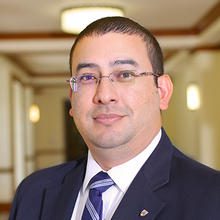
Joe Soto: The Full-Time MBA program allows students the opportunity to immerse themselves in a combination of academic, student life and career opportunities. For most of our students, this is the last opportunity to devote this amount of time and resources to enhance their career prospects.
MetroMBA: What is the typical profile of a student who would benefit most from this program and what characteristics are your admissions team looking for?
Joe Soto: A student looking to transition into a new role or industry would benefit from joining our Full-Time MBA program. This program is designed to help a student make a smooth transition across various industries, geographies and functional roles.
MetroMBA: What types of financial aid are available to students?
Joe Soto: We consider all applicants for merit-based scholarships. There is no additional application process to be considered for scholarships. We also have a Student Financial Services team that offers one-on-one consultations with admitted students to discuss their unique financial situation, the loan process, tuition payment plans, and other financial aid opportunities.
MetroMBA: How does your school assist in finding job opportunities and how does your program enhance a student’s profile as a job applicant?
Joe Soto: Rice Business has a fantastic Career Development Office that exclusively supports our MBA students. This office is actually comprised of two teams: Career Advising and Employer Relations. Our career advisors provide career coaching to help our students prepare for the corporate recruiting process or promotion conversations. One amazing perk of our program is that alumni still have access to our career advisors. The other team in the Career Development Office focuses on developing relationships with companies. The Employer Relations team assists companies with hiring our MBA students via information sessions, coffee chats, club events, industry treks, job boards, sponsorship, etc. Students can also access additional corporate recruiting support and company engagement events by joining one of many full-time MBA associations. Some of the most popular are the Consulting Association, Finance Association, Entrepreneurship Association, Technology Association and Rice Business Board Fellows. Our program enhances a student’s profile by developing them as leaders, creating a safe space for them to apply what they learn during experiential learning opportunities, teaching them how to properly navigate the corporate recruiting process, and customizing the curriculum to achieve their specific career goals.
MetroMBA: What is one insider tip you can provide prospective applicants about applying to this program?
Joe Soto: Prospective students are constantly concerned about the size of the alumni base. While a valid point, prospective students tend to forget about the importance of having a responsive alumni base. Our smaller-but-mightier alumni are actively involved in meeting with and guiding students and fellow alumni.
Lightning Round
What is one restaurant every student must visit and why?
This is a really tough question given the vast amount of great restaurants in Houston; I always recommend Crawfish and Noodles as a “can’t miss” stop. Hopefully, you visit during crawfish season but I think this restaurant is the epitome of Houston; it blends two distinct cultures into one synchronous tasteful experience.
Where is the best cup of coffee on campus?
Hands down, the best coffee is at the Student Coffee House in the Rice Memorial Center. Where else can you support the undergraduates and get a cup of coffee for $1? We also have a convenient new coffee shop, Audrey’s, centrally located in McNair Hall, which is home to Rice Business.
What is the best ‘hidden secret’ on campus?
The James Turrell Skyspace is a hidden daytime gem. The art installation is popular at sunset and sunrise but it’s a great place to relax and enjoy lunch with friends.
Contact:
Name: Joe Soto
Title: Director of Recruiting
Email: jas2@rice.edu
Phone: 713.348.5127
Toll-Free: 888.844.4773
Real Humans Alumni: Syracuse University, Whitman School of Management, On-campus MBA – Deedi Brown
School and Program:
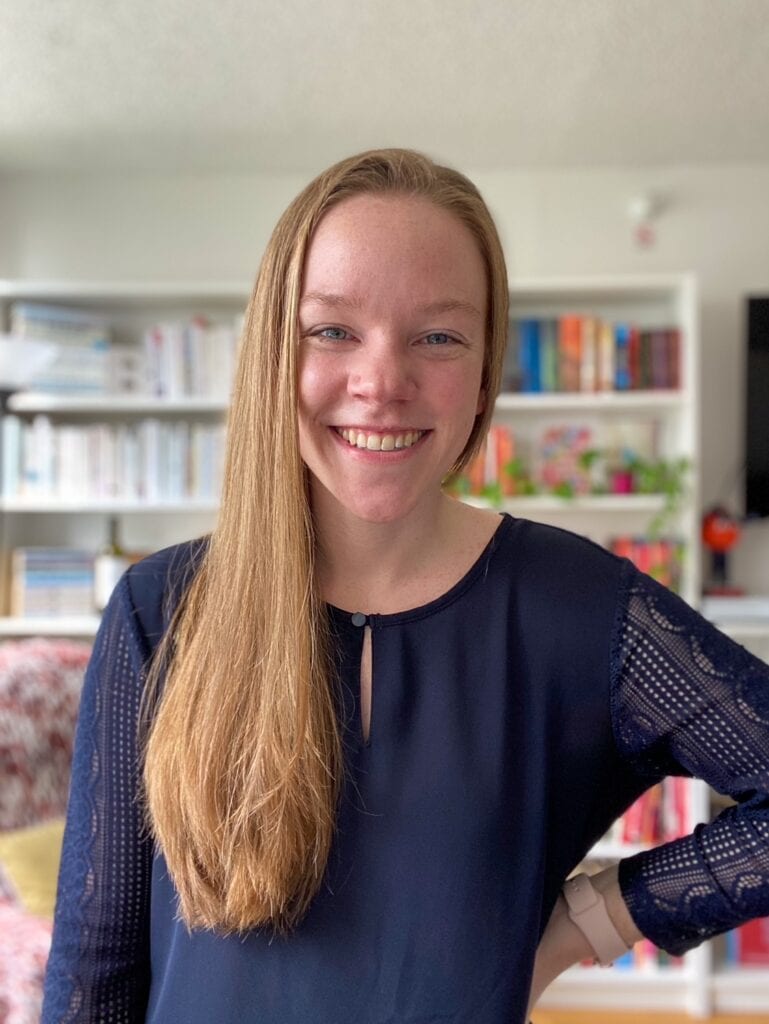
Syracuse Whitman On-Campus MBA
Hometown:
Cortland, New York
Undergraduate Institution and Major:
Binghamton University with a dual bachelor’s in marketing and theatre.
Pre-MBA Work Experience:
I got my MBA right after completing my undergrad degree, although I had had several internships as well as on-campus leadership experience.
What were the factors that led to you pursuing graduate degree? Why business school?
I always knew that I was going to want a master’s degree, and rather than starting to work full-time, then taking a break to go back to school, I figured I might as well finish school all in one shot. The MBA called to me because I knew that I had skills that could take me down a variety of different career paths, but I also had gaps between them. I wanted to continue to explore while filling the holes in my skillset, broadening my professional network, and getting on-hands experience in real-world situations.
What factored most prominently into your final choice of where to study? Why did you pick your school/program?
I grew up in the Syracuse area (and had attended quite a few SU basketball games in the Dome as a kid), so a part of me had always wanted to be a student there. But I also knew how much the university means to the broader community. I’d loved working with local businesses and nonprofits during my time at Binghamton, and so I was eager to attend another school with strong local ties. I was also drawn to the small, intimate feel of Whitman’s MBA program nestled inside such a vast, resource-rich university.
How did the school/program that you chose contribute to your career progression? How did what you learnt in the program help you find your post-graduation job?
I absolutely found my way to the career I love during my time at Whitman — specifically through my involvement with student groups and classes that put me into contact with real, local businesses. It started during my time in the Whitman Consulting Club, helping business owners create Facebook pages and websites. That sparked my interest in digital marketing more broadly, and I sought out more classes and projects where I could develop those skills.
Today, I lead an educational content product at a fintech startup. My passion got me here, but so did my education — I wouldn’t have had the vocabulary to start writing about finance and investing if I hadn’t pursued an MBA, which exposed me to so much more than just digital marketing.
What was your favorite thing about the city/campus?
I loved the small, intimate feeling of the Whitman school nestled inside the large university that is Syracuse. And I loved how connected the school is to the local community, which made me feel engaged and provided me with so many real-world learning experiences.
Would you do anything differently if you could research and apply to business school over again?
No! I loved it and wouldn’t change a thing.
What do you think is the biggest myth about business school?
The biggest myth is that all you learn how to do is write resumes and use Excel (although there definitely is a lot of that). Business school is about broadening your horizons, learning the skills you’re lacking, and building a network of people who will support you throughout your career.
What is your advice for incoming students to the program? And how can they get the most from an MBA experience?
My advice is to take hard classes. We’re all conditioned to care about our GPA above everything, but the truth of the matter is that the exact grades you get during your MBA program just aren’t important. The important part is that you are learning things you didn’t know before, filling in the gaps in your skillset, and becoming good at what you do. That literally just doesn’t happen when you only take classes that you know you can get an A in.
Fun fact that didn’t get included in your application:
I read 150 books last year.
Rice Business Equips You To Excel As 21st Century Business Leaders
Sponsored Content
Looking for a job that’s future-proof? At Rice Business, students become 21st century business leaders by making their own future, with first-rate foundational knowledge, expert technical training, practical experience — and powerful relationships based on collaboration and shared values.
A stellar career today often includes both a traditional climb up a corporate structure – and the exhilarating, high-stakes launch of a startup. Rice Business, ranked #1 in Entrepreneurship in Princeton Review and Entrepreneur Magazine and #3 in Finance by the Princeton Review, is exceptional for its blend of high-level classroom skill and practical training, said Professor Barbara Ostdiek, our senior associate dean. “Rice Business offers a balance of a traditional core curriculum focused on foundational and functional knowledge, wrapped in opportunities to apply that learning in real-time, guided practice,” she said.
An MBA Program That Listens To Students
The outcomes speak for themselves. Class of 2020 member Doug Fiefia, born in Tonga and raised in Utah, is heading to Google as a manager in customer solutions. At Rice Business, he said, one of his most powerful learning experiences has been in student leadership. In the school’s small, collaborative environment, even first-semester students are pushed to lead and shape campus groups.
“During the first year of my MBA, I realized there was no formal process for voicing student concerns and ideas,” Fiefia recalled. “I met with several stakeholder groups to try to resolve this gap and we came up with a tool called Owl Voice.” Feedback from the popular tool now goes to student officers, who respond in collaboration with staff, faculty and school leadership. “I’m grateful that I am part of an MBA program that listens to students,” Fiefia said.
Linking Business And Public Policy
Norma Torres Mendoza, also class of 2020, will be going to Ernst & Young. Torres Mendoza said she chose Rice Business for its many scholarship opportunities, its small size and its partnerships with international universities. A key element of her education, she said, was studying Business-Government relations with Professor Doug Schuler. “He teaches us that business should not and cannot work isolated from politics and the external world,” she said. “He created a bridge between the business and public policy worlds and has reinforced my passion for international mergers and acquisitions. Furthermore, he continues to teach us that all of our business actions have consequences, and as business leaders, we must have a consciousness about the positive and negative effects of our strategies.”
Bringing Houston To Rice Business Students
For all Rice Business students, interacting with Houston — the fourth largest and most diverse city in the country – is an essential part of the program. A roster of short elective courses allows our students to learn directly from the city’s top-tier business leaders on key emerging business topics. These immersive, experiential short courses cover topics such as digital disruption in financial services, block chain as a new economic infrastructure, building the data-driven firm, SQL for managers, and commercial real estate in the new economy.
“A benefit of sitting in Houston is our ability to tap phenomenal business leaders to bring their perspective and expertise to our students,” Ostdiek said. “At Rice Business, we are able to blend a small, intimate, elite university environment with this vibrant commercial center. We make a point of bringing Houston to the students.”
Rice Business fortifies this classroom experience with hands-on work. “Our students apply what they’ve learned on messy real world problems,” Ostdiek said. Second year Rice Business students can choose from a roster of specialized “lab” courses where small teams work on real problems for corporate clients or, in some cases, the students’ own new product ideas or business acquisition initiatives. Among these courses are the Wright Fund, a student-led investment fund, the Athena marketing group, and labs focused on health care operations, supply chain challenges, international energy entrepreneurship, new enterprises, and enterprise acquisition.
Prepares You For A Range Of Opportunities
Rice Business also prioritizes diversity. Both research data and practical experience agree: 21st century business leaders need to be able to interact with a range of colleagues, economies, resources and cultures. Our program includes a required Global Field Experience that includes consulting with companies and organizations in the host country. Students also have the option of studying abroad at a broad network of partner institutions.
On campus, the small student body ensures that professors know your name – and students from an array of backgrounds become lifelong colleagues. All are eligible to tap the Doerr Institute for New Leadership for free, expert coaching on professional and personal development. To Dominic Smith, class of 2020, this Rice Business network was crucial preparation for his new position at Wells Fargo as an investment banking associate.
“I am most proud of being selected to work in the Wright Fund,” Smith said. The rigorous student-led equity fund, he said, thoroughly prepared him not only for investment banking — but a range of other possible career paths. Meanwhile, outside the classroom, as Co-President of the Black Business Student Association, Smith joined his classmates in creating an innovative business case contest for local second graders. In addition to prepping and judging the students, Smith said, his team has set up a meeting for the second graders with executives from a Fortune 100 company. The topic? Their own goals as 21st century business leaders.
Contact:
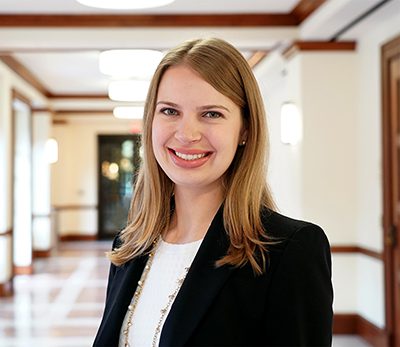
Name: Kalyn Speck
Title: Assistant Director of Recruiting, Recruiting and Admissions
Email: kms15@rice.edu
Phone: 713.348.3732
How Rice Business Protects Its Learning Community During The Pandemic
Sponsored Content
At Rice Business, one of the first principles MBA students learn is to have a strategy. Whether it’s for a startup or an established organization, they’re taught that knowing their goals and preparing for adversity are key for performance. As the world confronts COVID-19, that lesson has proven apt for the school itself.
Located at a top research university near the world-class Texas Medical Center, Rice Business built on an existing, state-of-the-art safety infrastructure and its own culture of collaboration and leadership. In a recent conversation, Adam Herman, executive director for MBA student services, outlined the steps that make Rice Business both COVID-19 resistant – and as competitive as ever.
Thanks to the ability of faculty and staff to pivot to online course delivery, and to an early investment in technology, the school quickly reinvented its delivery of top-tier business training. “Our pandemic actions are an outgrowth of who we really are,” Herman said. “We’re an intentionally small business school located within a superb university community. As a part of Rice University, we used the university’s excellent protective protocols from the start, working closely with its university-wide Crisis Management Team.” As a result, Rice Business was able to quickly add adaptations for its own students. This has led to a learning community that has managed to keep COVID-19 cases relatively low while providing the same top education for which Rice Business is known.
At the university-wide level, protective measures now include:
- Regular testing of all community members through PCR-based mitigation testing
- An extensive contact tracing apparatus
- A COVID-19 dashboard
- Weekly community updates
Committed To Individual Responsibility
Both the university and Rice Business are committed to Rice’s university-wide standards of individual responsibility. “Among other policies, that means having our community members wear masks at all times on campus, except when eating, and to maintain six feet of distance,” Herman said. “We also utilized the university’s Culture of Care framework to remind students of our collective duty to each other, both with on-campus and off-campus behaviors.”
Within Rice Business the school’s signature collegiality promptly reinforced these policies, he added.
But collegiality, he noted, doesn’t imply as acting in lockstep. Because of the diversity in students’ lives and work responsibilities, Rice Business leadership prioritizes individual choice and judgement. No student, for example, is required to come to campus. Instead, Rice Business invested in new ways to deliver its programs and services to all.
Because student-led clubs, friendships and spontaneous chats all help build the unique, collaborative Rice Business culture, the school has been innovative in preserving them. “Student life programming, including student club and organization activities, continues,” Herman said. “We continue to deliver some activities like our now-online partio – the beloved weekly party on the patio. Case competitions take place online or in hybrid form: the October Adam Smith Society case competition, for instance, took place in hybrid mode, allowing both on-campus participants and remote team members to present to guest judges.”
Trainings on Agile and Six Sigma have been delivered online by the Consulting Association and the Operations and Supply Chain Association. Students even venture off-campus for outdoor outings hosted by the Golf Club – with six feet of distance, naturally.
When Feasible: Flexibility In Class Modes
Whenever feasible, Rice Business offers choices on how to attend class. Until recently, students and faculty had freedom to choose their classroom options, including fully-remote mode or modified modes for specific needs, health concerns and risk calculations.
“In the fall,” Herman said, “most students used what we call our two-room, dual-mode hybrid learning environment. It provided seats in on-campus classrooms for students in the majority of instances when they want to attend on campus.”
This January, as external COVID cases rose sharply, Rice turned to remote-only classroom attendance for community safety. As vaccination availability increases and COVID cases drop, Herman said, the school will pivot again to its multi-choice model.
At any time, students may take classes via fully-remote delivery from home or elsewhere, getting the same educational experience that they would in person. To ensure this quality, last summer Rice Business invested more than $1 million in technology, installing sophisticated microphone and video arrays allowing students to be easily seen and heard by their instructors and peers – wherever they are.
Top Ten Ranking In Classroom Experience
As a result, Rice Business teaching has continued to flourish: Last year, the Princeton Review gave Rice Business a #10 national ranking for classroom experience.
Maintaining student safety along with academic excellence has also shown the school’s interlocking strengths, Herman noted. “The student program office, all the folks who provide faculty and IT support, the professors, all ensured that students had the specific classes they needed to graduate on time.”
The real test of Rice Business, of course, is what happens after graduation. Here, too, the school has upgraded its already intensive career guidance. “Thanks to direction by Phil Heavilin, executive director of the Career Development Office, we offer all the same career services an MBA student would expect,” Herman said. “But we’ve also retooled our coaching and career education and infrastructure, so students are now prepared to do remote interviewing. In fact, many corporations are now recruiting remotely for the first time.”
No business student plans to have their graduate work upended by a pandemic. Even so, at Rice Business, teaching adaptability is business as usual. “Our students are already using the resilience, adaptability and critical thinking that come from not knowing what the future will look like,” he said. Because of the extraordinary measures taken to keep them safe, he said, “Rice Business is able to be a powerful lab – and a psychologically safe one – to experiment and then have this experience in your toolbox.”
Contact:



Name: Kalyn Speck
Title: Assistant Director of Recruiting, Recruiting and Admissions
Email: kms15@rice.edu
Phone: 713.348.3732
Online MBA
Pace University Online MBA Program Structure
The Pace University online MBA is designed for working professionals. Students can complete the program part- or full-time completely asynchronously, and gain the multifaceted industry knowledge necessary to become strategic, business problem solvers from the comfort of their own homes.
This 100% online program has been handcrafted by expert faculty to ensure that students are career-ready upon completion and also acts as an incubator for students to network with other business professionals around the world.
Whether looking to become an entrepreneur or advance in the workplace, students in this program are prepared for success. The Lubin School of Business is dually accredited for both business and accounting by the Association to Advance Collegiate Schools of Business (AACSB) International, an elite distinction shared by fewer than 2% of business schools in the world. We are also the #1 private university in the nation for the upward economic mobility of students, according to Harvard University’s Opportunity Insights.
Curriculum at the Pace University Online MBA Program
Our 39-credit-hour MBA program offers students an opportunity to build upon their leadership skills and earn an advanced degree in 2 years part-time or 1 year full-time.
We believe students learn by doing. Because of this, we put an emphasis on project-based learning to ensure that students graduate with both theoretical business knowledge and practical experience. Students complete individual and group assignments such as creating regression models and analyzing their data, or building and running their own business prototypes.
The Pace University Online MBA focuses on the core areas of focus in business such as business economics, marketing performance, operations management, strategy, and analytics. The program consists of 10 required courses and a choice of 3 elective courses.
Class Profile
Average GPA: 3.19
% Female: 68.75%
% Male: 31.25%
Age Range: 21-58 years old
Career Statistics
The online Master of Business Administration is a competitive program from the #1 private university in upward mobility. In 2019, 95% of graduates from Lubin School of Business master’s programs were employed or continuing their education upon completion from the program. They also earned an average base salary that was over $30,000 more than the average US worker.
Tuition, Scholarships, and Financial Aid
The current cost of the Pace University online MBA program is $1,344 per credit hour, with a total tuition cost of $52,416.
Students enrolled in Pace Online programs may be eligible for Federal Direct Stafford Unsubsidized Loans and private education loans to cover tuition and other education-related costs.
Eligible veteran students can also receive tuition benefits offered by the GI Bill.
Admissions
A bachelor’s degree in any field is required to apply. Students must also submit the following to be considered for our MBA program:
- Application
- Resume/CV
- Personal statement
- Official GMAT/GRE scores*
- Official transcripts for all college-level coursework
- Two (2) letters of recommendation
To satisfy the Proof of English Requirement, international students must also submit TOEFL, IELTS, Pearson PTE, or Duolingo academic scores.
*Students applying to the program who received a cumulative baccalaureate GPA of 3.0 or higher are not required to provide GMAT/GRE scores. Other individuals may be eligible for a GMAT/GRE waiver and will be evaluated on a case-by-case basis.
Application deadlines are as follows:
Pace offers six start dates every year: two in the fall, two in spring, and two in summer. We review applications on a rolling basis, so you are welcome to apply any time before the posted deadline.
The next start date is
January 24, 2022
The application deadline is
January 10, 2022
Ask Stacy Blackman Consulting How They Can Help You Achieve Your MBA Goals
MetroMBA exclusively recommends Stacy Blackman Consulting (SBC) for MBA Admissions Consulting. Since 2001, SBC clients have been admitted to every top business school worldwide, often with merit scholarships. SBC has a complete panel of former Admissions Officers from every top MBA program in-house. The SBC team has MBA expertise at every top US and EU school, has graduated from the best MBA programs and understands career paths in every industry, traditional and non- traditional.
SBC limits the number of clients for each consultant, engaging with clients only after its Validation Team evaluates candidacy strength. Stacy Blackman Consulting delivers results, as shown through its record of the highest number of online reviews across multiple sites and the endorsement by MetroMBA. SBC offers a limited number of free consultations weekly for admissions consulting inquiries who have been pre-screened by our tenured team. Submit a request for a free consultation below.
![]()
![]()
Looking for GMAT GRE Test Prep? We have that too!


